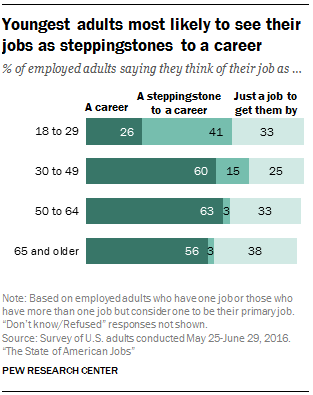 One of the challenges that we face today is the anticipation of a career. Although an interview is an opportunity to find a valuable candidate, it can give off varying impressions. It is tempting for the interviewee to avoid the lackluster pull of a ‘job’ that leads to no career.
One of the challenges that we face today is the anticipation of a career. Although an interview is an opportunity to find a valuable candidate, it can give off varying impressions. It is tempting for the interviewee to avoid the lackluster pull of a ‘job’ that leads to no career.
This can happen through self-sabotage of an interview, the first impression. For the millennial, we tend to fall into a cycle of ambition where we rebel against settling for a ‘job‘ to avoid career compromise.
A job is a paycheck–a way to get through the day and pay your rent, bills, and any outstanding costs. A career is a ladder towards your professional development-it is the culmination of long-term goals.
A lot of misconceptions lie around how we interpret the two. It starts with how we perceive a ‘job’ as a stepping stone to career goals. Viewing a ‘job‘ or paycheck as immediately supportive of career goals can lead to dissatisfaction and anxiety.

A June 29, 2016 study shows a majority of adults from 18-29 view their job as:
- either a steppingstone to a career or
- a job to pay the bills
This is a pool of candidates that we can learn from and impart our guidance on. Millennials come in with excitement to gain experience and can be molded through mentorship and guidance. Additionally, they permit us to think of new ways to approach and envision technology.
While I do not see technology as an absolute requirement, it is undeniably a helpful tool to improve processes and promote structure. Our society is shaped towards technological advancement, and recruiting this group type will help us with our challenges.
Here are some brief tips to recruit and have the highest capacity of candidates:
- Be transparent. Share your expectations and create a space of engagement.
- Ask concise questions. A habit I experienced in some federal interviewers is the tendency to ask three to four questions at a time.
- Slow down and observe. Making your candidate nervous through intimidation will not be effective.
- Have a diverse pool of interviewers. This will help give any candidate a sense of comfort.
- Address and acknowledge biases for the perfect fit.
Nhu-Phuong Duong is a GovLoop Featured Contributor. She is a recent grad with a Master’s of Arts in English and the Humanities. Nhu worked in several non-profit organizations serving the homeless in DC and New York City and currently works as an analyst for the federal government. With two years in her current position, Nhu deploys project management strategies to improve efficiency and efficacy. In her undergrad, Nhu studied English and Philosophy with a track in Performance in Media Studies. Research follows the Baudrillardian studies and the influence of simulation and hyperreality on human interaction in the social and political spaces. In her free time, she attends bluegrass shows and homebrews. You can read her posts here.





I really enjoyed this post, especially the tips for recruiters. You’re spot on about interviewers often asking 3-4 questions at once!